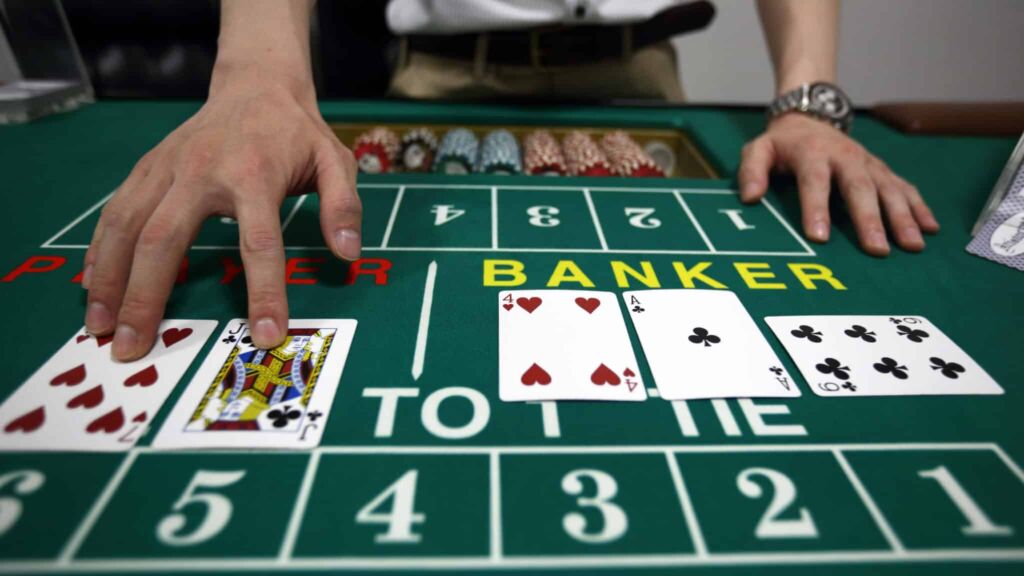Is there truth to casino games being manipulated? From inexperienced players dipping their toes into gambling to the most seasoned high-stakes adventurers, the idea that games may be skewed is a common contemplation. Having a strong grasp of game mechanics and probabilities is vital for those wishing to gamble responsibly while making educated choices.
The House Edge: Built-In Advantage
The notion of 'house edge' is pivotal in understanding casino games. Rather than being 'rigged,' it's more about a meticulously calculated statistical margin designed for long-term profitability of casinos. Each game, from slots to blackjack, includes a built-in house edge that's represented as a percentage, signifying the expected average gain the casino can expect per wager placed by players.
Consider American Roulette, featuring two green slots (0 and 00) alongside numbers 1-36; it boasts a house edge of about 5.26% . Essentially, for every $100 wagered on this game, the casino anticipates profiting $5.26. In contrast, European Roulette, which has a single zero, offers a reduced house edge near 2.7% , providing statistically better odds for players.
While the house edge does not guarantee outright wins for the casino in each game or bet, it's the long-term occurrence of bets where the principle of large numbers manifests the casino's statistical edge, thereby ensuring steady profit over time.
The concept of a house edge is separate from that of a game being 'rigged.' House edge is a clear, mathematically driven advantage ingrained within the game’s structure and payment systems, whereas rigging suggests an unfair manipulation of outcomes beyond the obvious house advantage.
The reliance on Random Number Generators (RNGs) is pivotal in the world of casino games.
In the modern era, particularly online, games' outcomes are determined by Random Number Generators (RNGs). These advanced algorithms are intended to deliver sequences of numbers that are statistically random and not predetermined, becoming the core technology behind slots, video poker, and several online gaming activities.
A genuine RNG should have key characteristics: random output, meaning no detectable pattern; unpredictability, ensuring future outcomes can't be judged based on past numbers; and even distribution, where every potential number has an identical probability of being drawn. To ensure games remain fair, credible online casinos utilize certified RNGs which undergo regular evaluations and audits by independent agencies.
Agencies like eCOGRA (e-Commerce Online Gaming Regulation and Assurance) and Gaming Laboratories International (GLI) subject RNGs to rigorous statistical verification to ensure they maintain fairness and randomness. These evaluations look into bias, pattern formation, and predictability, with regulated casinos frequently required to employ such certified RNGs subject to consistent audits to retain their licenses.
While RNGs aim for randomness, it's key to recognize that 'random' here pertains to statistical randomness, rather than philosophical unpredictability. Computer algorithms follow a predetermined rule set, yet cleverly designed RNGs use intricate algorithms, sometimes incorporating external randomness sources, thus creating outcomes that are practically unpredictable for the player and statistically reliable for honest gameplay.
The correct implementation of RNGs helps ensure increased fairness and openness in casino games, better than dated mechanical alternatives. Traditional slot machines could suffer from wear or manipulation impacting their randomness. In contrast, well-regulated RNGs secure consistency and transparency.
Regulation and licensing guarantee fairness in gameplay.
In most areas, gambling is tightly regulated to safeguard consumers and ensure game fairness. These regulatory bodies, which can be government-based or independent, handle licensing casinos, establishing game fairness standards, and overseeing casino functions, thus preventing manipulation and preserving the industry's integrity.
Licensing is a core component of regulation. Casinos in regulated territories must secure a license from the appropriate entity, meeting strict standards regarding financial health, security, responsible gaming, and importantly, game fairness. These entities execute extensive operator background checks, watch financial dealings, and audit games and RNGs to guarantee adherence.
Rules often mandate minimum return rates for specific games, notably slot machines, ensuring, say, a slot returns at least 85% or 90% of wagers to players over time. Although it doesn’t promise wins per individual player, it establishes a baseline for casino retention rates.
Moreover, regulation extends to settling player issues and disputes. If someone suspects foul play or rigged games, they can appeal to the regulatory body. Investigations might lead to consequences like fines or license suspensions, proving an oversight mechanism that protects players.
Still, regulatory intensity varies locally. Casinos in well-regulated areas like Nevada, New Jersey, the UK, and Malta undergo more scrutiny than those in less regulated offshore areas. Being aware of a casino's licensing authority can steer players towards fairer gameplay.
Debunking wrong beliefs and the \"Gambler’s Fallacy.\"
Despite safeguards and RNG tech ensuring fairness, suspicions about games being rigged are common among gamblers. Often, these stem from misunderstandings of probability, randomness, house edge, or psychological biases that skew perceptions. A widespread misunderstanding is the 'gambler’s fallacy,' known also as the Monte Carlo fallacy.
The gambler’s fallacy is the erroneous notion that preceding events sway forthcoming independent ones. In gambling, it’s finding belief that after recurrent losses, a win is imminent, or after several reds in roulette, a black is more due. Actually, games with random results have independent events; each roulette spin, card deal, or slot play stands independent of its predecessors, maintaining the same odds every time.
For instance, if red hits five times consecutively on a roulette wheel, the probability of red again remains unchanged from prior spins (nearly 47.37% in European Roulette excluding the zero). The wheel is unaffected by past results, and no inherent mechanism exists to make black overdue. Taking on the gambler’s fallacy can cause poor betting choices, amplifying losses.
Another myth is the assumed ability of casinos to secretly manipulate RNGs or outcomes in real time, causing players losses. While conceivable in unregulated or rogue operators, this prospect in licensed and regulated settings is slim, as the risk of exposure, severe consequences, and brand harm drastically outweigh short-lived gains from such manipulation. Evaluations and checks by regulations deter and detect alterations.
Furthermore, house edge inherently yields considerable and reliable gains for casinos long-term. Licensed establishments typically lack economic motivation to pursue illegal and hazardous rigging when the mathematically-backed design already favors them.
Game Types and Probabilities: Grasping Distinctions.
Though casino games aren't rigged to unfairly mislead players, it’s vital players recognize how diverse games, or even variations of one game, showcase distinct odds and house advantages. Educating oneself on these disparities is crucial for sound gambling decisions.
Take slot machines as an example; these devices are noted for varying significantly in house advantage, often more so than traditional table games. The Return to Player ratio, also known as RTP, in slot machines spans a spectrum from less than 90% to above 98% , contingent upon the specific title. Gamers are best served by seeking out high RTP slots for better chances of winning, yet this information can be elusive and differs according to the region's laws.
Games at tables such as blackjack, baccarat, and craps typically offer players a smaller house edge compared to slot machines, especially when a player follows an optimal strategy. In blackjack, player skill profoundly affects the house advantage. With basic strategy, the house edge can be minimized to less than 1% in certain versions. However, any deviation from optimal play raises the house edge, ultimately benefiting the establishment.
Different versions of a particular game can present varying odds. European Roulette, for instance, presents a lower house advantage than American Roulette because it only has a single zero. Likewise, there's variation in video poker games owed to disparate payout structures, directly influencing the house advantage. Familiarizing oneself with the rules and payouts of chosen games and selecting those with the best odds improves game outcomes.
While progressive jackpot games promise extraordinary winnings, they tend to offer lower overall payout rates as funds are diverted into the growing jackpot. While there's a chance to hit a grand prize, each spin or hand comes with lower winning probabilities than standard games.
Understanding the Psychological Dynamics: Perceived vs. Established Reality
The notion that casino games are rigged is often bolstered by psychological influences. Gambling invokes strong emotions, and experiencing losses can evoke feelings of injustice, even when games are statistically equitable. Cognitive biases, like the “availability heuristic” (overvaluing occurrences that readily come to mind, such as tales of rigged games) and “confirmation bias” (seeking data that aligns with existing beliefs), cement such perceptions.
The architecture and design of casinos also contribute to this perception. Casinos are meticulously designed environments aimed at maximizing player engagement and expenditure. Features like the lack of windows or clocks, ubiquitous alcohol, and exciting lights and sounds create an immersive experience, potentially clouding judgment and encouraging impulsivity. While these factors do not fix game outcomes, they can influence player decision-making and perceived fairness.
Moreover, gambling's intrinsic randomness between wins and losses can sometimes appear as suspicious patterns to players. Loss streaks, which are part of expected statistical variations, may not personally target a player but can feel so, leading to distrust. Maintaining a rational understanding of statistical variance helps players analyze outcomes without falling into emotional traps.
Prudent gambling includes setting limitations on time and finances directed at gambling, comprehending house advantages and game odds, and recognizing the point when gambling becomes problematic. Seeking credibility-rich information regarding game structures and probabilities helps players cultivate a clear understanding of casino gambling, reducing impulsive judgments about fairness.
Understanding the House Advantage within the Casino Framework
Claims that all casino games are intentionally rigged are mostly inaccurate, particularly in the context of licensed and overseen casinos. Casinos' profitability fundamentally lies in the strategic advantage known as the house edge, baked into game mechanics and payouts. This pre-calculated edge ensures that casinos, over time, will gain from players' betting activities.
Esteemed casinos rely on certified Random Number Generators (RNGs) and undergo scrutiny through both regulatory bodies and independent audits to confirm fairness and deter manipulation. While the house edge assures profit for the casino, it doesn't imply direct rigging. Many players do win; understanding these games as chances of mathematical probability skewed towards the house in the long haul is pivotal.
Misunderstandings about game rigging often arise from misinterpretations of probabilities, biases, and emotional effects of losing. Educating oneself about game chances and odds, along with adhering to fair gambling habits, is essential for informed and balanced gambling perspectives. Playing in credible jurisdictions and licensed venues enhances fairness confidence.
Ultimately, the debate isn't whether games are tampered with, but whether players recognize and accept both the house edge and gambling's inherent randomness. In a fair casino setting, games earn profits through calculated probabilities, not through deceit. Responsible gambling means setting limits, acknowledging risks, and viewing gambling as entertainment potential with chances of both winning and losing.
External Resources:



